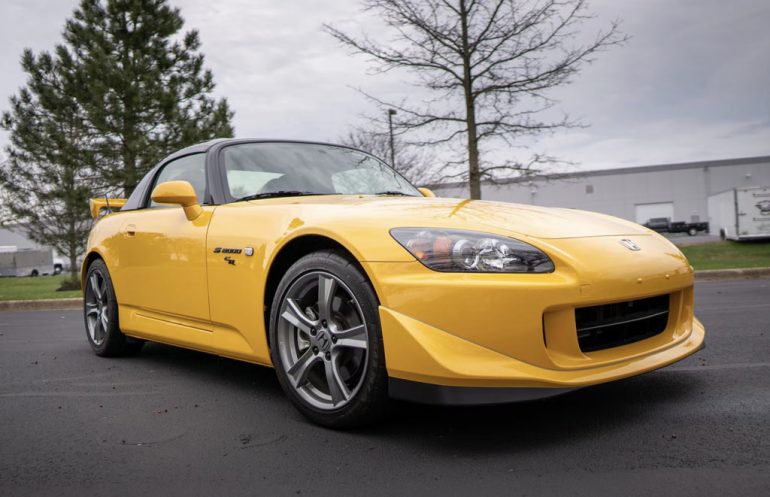There are some great Japanese cars to own if you love speed.
1. Toyota MR2
The Toyota MR2 which is built using off-the-shelf genuine Toyota parts was conceptualized as a fun-to-drive coupe that was within the budget range of most people at the time. Back at the turn of the century (‘80s and ‘90s) Toyota was heavily invested in producing affordable cars that had precise transmission, were responsive and had a great engine.

Before long, Toyota went ahead to add a supercharger to the MR2 before adding a turbocharger to the second-generation MR2s. The turbocharger had the impact of adding more power to these cars. There were however small differences between the US-produced and Japan-produced models. The Japanese versions of the MR2 had a second catalytic converter, a more aggressive fuel map, a ceramic turbocharger, and an extra 25 horsepower. You can bring this machine in if you wish to import it via the correct automotive logistics and means.
2. The Subaru Impreza WRX STI
The first Subaru WRX was a versatile and impressive machine that had a 2.5L turbocharged engine and an all-wheel-drive system. The car was extensively used in rallies and even ended up winning some rallies. It took some time for the STI and its predecessor – the WRX to hit the U.S. market with the STI hitting dealerships in 2004.
If you think the STI is a bit slow, how about going for one of the Subaru 500 RA models? RA is an acronym for Race Attempts, which refers to the record-setting, race tuned WTX-STI Type RA NBR. The 500 RA models come with 2.5L flat-four system that gives up to 300 horsepower. The models also have a new inverted Bilstein struts that provide better feedback and transmission response compared to the standard Subaru WRX STI.
3. Honda S2000 Type S
The Honda S2000 can be likened to the beauty of a dying star. It was a brilliant machine that followed the design of a classic sports vehicle – with a front-wheel and rear-wheel drive, and, an engine at the front. The machine had a formidable engine that performed great whether on a race track or a rocky mountain track. The Japan and U.S. models were basically similar except for the ECU map which was different because of the octane fuel used in each country.
In the last 2 years of producing the Honda S2000, the Japan released the Type S model which incorporated features found in the Club Race edition which was only available in the U.S. The only difference between the Japanese Honda S2000 Type S and the Club Race models in the U.S was that the Club Race model was designed purely for track racing while the Type S had more creature comfort features.
4. Honda Civic Type R
When the EK9 Civic was first released by Honda, many opined that its exterior did not draw glances. However, under the hood lay exceptional engineering marvels including dual-cam models, a front strut brace, comfortable Recaro bucket seats, and, limited-slip diff capabilities. Though the EK9 (the first Honda Type R model) received many “VTEC kicked in” memes, it still wore the Type R badge with pride.
Honda’s most modern Type R – the FK8 is a great machine that boasts great aero capabilities and a four-cylinder turbocharged engine that spews 306HP. The FK8 set a new record in Nürburgring when it lapped a circuit almost 7 seconds faster that its immediate predecessor in the Type R series – the FK2.
5. Toyota AE86
This car is perhaps one of the most famous models in the world. Widely linked to Tofu deliveries, the lightweight AE86 which boasts of rear-wheel drive capabilities was never meant to be the face of drift driving. According to legend, Keiichi Tsuchiya, a mountain racer, used to throw his AE86 sideways to amuse crowds. However, when antics were posted on the internet, they instantly went viral.
One of things that drivers find alluring about the AE86 is that its engine only fully comes alive when one if over-revving. At 128HP, drivers can control the AE86 using their drifting skills rather than relying on the throttle.
6. Nissan Pulsar GTI-R
While everybody’s focus was on the Nissan R32 GTR in the early ‘90s, the company was developing and releasing the smaller Nissan Pulsar GTI-R to compete in the upcoming World Rally Championships. The Pulsar came with an SR20DET 2L turbocharged engine that gave 230HP and could move from 0 -60 mph in no more than 5 seconds.
The Pulsar was never released in the U.S. and it didn’t also enjoy rally successes like other cars in the GT-R series thanks to strong competition from Toyota and Ford. However, the Nissan Pulsar GTI-R was a huge success in other parts of the world. In Japan, it was affectionately referred to as the “Baby Godzilla.